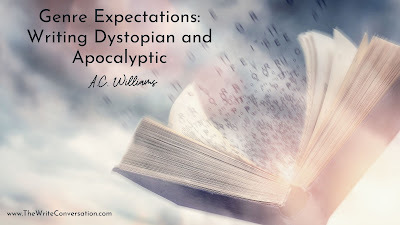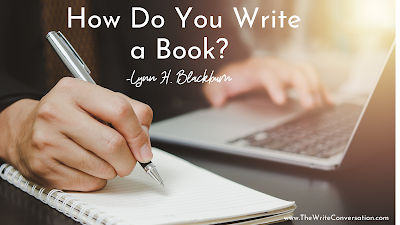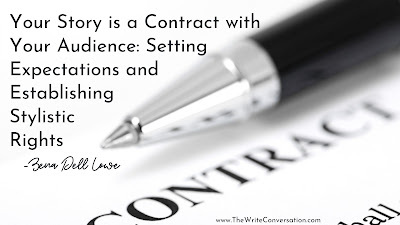Edie Melson's Blog, page 44
August 1, 2024
Genre Expectations: Writing Dystopian and Apocalyptic

by A.C. Williams @ACW_Author
What do you do when the sky is falling? Or if some unstoppable natural disaster has sent the entire world into political and economic upheaval? Or what if the powers of democracy fail, and the free world tumbles into the abyss of totalitarian rule?
If any of your stories ask those questions, you are writing either a dystopian novel or an apocalyptic novel, but don’t make the mistake of thinking they are the same. They may be similar in some of their tropes and aesthetics, but the core of what makes each genre different is surprisingly unique.
But first, let’s do a quick review of the genre expectations we’ve discussed so far (Links at the end): Romantic Fantasy and Fantasy RomanceFantasy and Space OperaSteampunk and GaslampMagical Realism and Contemporary FantasyUrban Fantasy and Paranormal RomanceSuspense and Thrillers
The next on the list to tackle are the genres of Dystopian fiction and Apocalyptic fiction. In many ways, they are very similar to each other. They both deal with fairly dark subjects, usually grim plotlines set against an equally grim backdrop of “the world gone wrong.” The core of what separates them, however, boils down to how the world went wrong in the first place.
Dystopian stories are actually more similar to political thrillers than anything else. Normally, the dystopian genre is set in a futuristic society, but this isn’t the future Gene Rodenberry envisioned when he created the Star Trek franchise. The world of Star Trek is generally regarded as a utopia, and a dystopian storyworld is the exact opposite.
In most instances, dystopian stories feature totalitarian regimes of some form or another. Sometimes they are tyrants or evil monarchs. Sometimes they are entire nations that have taken over the other countries on the continent. Sometimes it’s just a group of people who rose to power in a society and have used their accumulated power to crush anyone who disagrees with them.
Regardless of how those in power got there, the point of a dystopian storyline is usually focused on the resistance. A dystopian story is about how a handful of underdogs refuse to accept the world the way it is and believe they can change it for the better.
Perhaps the most classic example of the dystopian genre is 1984 by George Orwell. If you haven’t read this little book, please make it a priority, if for no other reason than to be astonished at how accurate Orwell’s vision of the future turned out to be. (He wasn’t a prophet, but boy oh boy, 1984 is chillingly familiar.)
Another dystopian classic is The Handmaid’s Tale by Margaret Atwood and, of course, The Hunger Games by Suzanne Collins. Both of these feature power-hungry regimes that have taken over another people group by force and made their lives miserable. But the stories aren’t about the people who rose to power; the stories are about the people who are fighting for freedom.
I also can’t talk about the dystopian genre and not mention some of my favorite Christian authors who have ventured into this subject: A Time to Die by Nadine Brandes and A Star Curiously Singing by Kerry Nietz.
So what about apocalyptic fiction? What’s the difference?
Well, again, apocalyptic fiction tackles many of the same themes that dystopian does, but there is one major difference: Apocalyptic fiction isn’t about fighting for freedom, it’s about fighting for survival.
Apocalyptic stories usually pick up right after there has been some massive disaster on Earth. A plague or virus. A meteor strike. An alien invasion. A civil war. Our technology becoming self-aware. The disastrous options are limitless.
Whatever happened to wreck the world, the story begins in the middle of the horror, and it usually focuses on an underdog or an unlikely hero who is alone in the struggle to survive. Sure, there may be some political tropes involved. There may be some dystopian-feeling aesthetics, but the drive of the story is to simply make it out alive.
Examples of apocalyptic fiction include I Am Legend by Richard Matheson, World War Z by Max Brooks, and The Roadby Cormac McCarthy.
Of those three, I’ve only read The Road, and personally it was not my cup of tea. It certainly had some fascinating elements in it that were remarkable, but the whole book was a bit too gray and grim for my liking (although that’s par for the course for authors like Cormac McCarthy).
One of my favorite examples of apocalyptic fiction is actually a movie, The Book of Eli starring Denzel Washington, Gary Oldman, and Mila Kunis. It’s violent and challenging in many instances, but the core of the story is beautiful. There’s more to life than just surviving, after all.
And, well, nobody should talk about apocalyptic fiction without mentioning the Left Behind books. No matter where you stand on their theological accuracy, these masterworks by Jerry Jenkins and Tim LaHaye revolutionized fiction for Christians and taught an entire generation of people that the Rapture wasn’t a fairytale.
Many stories, both dystopian and apocalyptic, have hit the market in the past several years, but one thing is important to remember when writing in both of these genres. Don’t forget the hope.
Folks who read both these genres expect to be treated to darkness and grim situations and circumstances that look impossible to overcome, but nobody actually wants to read a story without hope. Keep that in mind the next time you’re writing (or reading) a book in either of these genres. Hope is what keeps people reading, whether they realize it or not.
TWEETABLEGenre Expectations: Writing Dystopian and Apocalyptic from @ACW_Author on @EdieMelson (Click to Tweet)
Don't Miss the Previous Posts in This Series 1. WRITING ROMANTIC FANTASY AND FANTASY ROMANCE 2. WRITING FANTASY AND SPACE OPERA 3. WRITING STEAMPUNK AND GASLAMP 4. WRITING MAGICAL REALISM AND CONTEMPORARY FANTASY 5. WRITING URBAN FANTASY AND PARANORMAL ROMANCE 6. WRITING SUSPENSE AND THRILLERS 7. WRITING DYSTOPIAN AND APOCALYPTIC
 A.C. Williams, also known as Amy C. Williams, is a coffee-drinking, sushi-eating, story-telling nerd who loves cats, country living, and all things Japanese. Author of more than 20 books, she keeps her fiction readers laughing with wildly imaginative adventures about samurai superheroes, clumsy church secretaries, and goofy malfunctioning androids; her non-fiction readers just laugh at her and the hysterical life experiences she’s survived. If that’s your cup of tea (or coffee), join the fun at www.amycwilliams.com.
A.C. Williams, also known as Amy C. Williams, is a coffee-drinking, sushi-eating, story-telling nerd who loves cats, country living, and all things Japanese. Author of more than 20 books, she keeps her fiction readers laughing with wildly imaginative adventures about samurai superheroes, clumsy church secretaries, and goofy malfunctioning androids; her non-fiction readers just laugh at her and the hysterical life experiences she’s survived. If that’s your cup of tea (or coffee), join the fun at www.amycwilliams.com.
Published on August 01, 2024 22:00
July 31, 2024
How Do You Write a Book?

by Lynn H. Blackburn @LynnHBlackburn
Sometimes this question is asked by someone who simply cannot get their mind around it. Sometimes it comes from someone who writes and is curious about my process.
Sometimes, the person asking the question is me! *I forget every time!*
I’m always looking for the best way to answer this, for myself and for others. And this summer, I found a new way to describe the process in an unexpected place.
My basement.
When we moved into our home thirteen years ago, the basement had a floor, a few windows, a door, a couple of framed out walls and, believe it or not, a fireplace.
We didn’t feel the need to finish the basement…until we did. Our boys are teenagers, and it was time to make that part of our home into a space where they and their friends could hang out.
It should come as no surprise to you that there were limitations. We couldn’t just do anything we wanted. We had walls that couldn’t be moved, a few load-bearing beams that weren’t optional, and a footprint that wasn’t flexible. We could let our imagination run wild…as long as what it generated would work within those boundaries.
We spent time brainstorming. We walked around the rooms with measuring tapes and paper, sketching out possibilities. Sometimes we had ideas that had to be abandoned. Sometimes we had multiple options, and it was a matter of choosing what felt right to us.
We had a few specific goals for our project that required extra work, such as specialized plumbing for the bathroom and tons of electrical wiring to accommodate flexible lighting options.
Even with all the thought that went into the preparation stage, it was still hard to picture what it would look like when it was done. We began the process, trusting that it would all come together as we moved along.
In the beginning, there were many days when, even after a full day’s work, it didn’t look like we’d made any progress at all. There were days when we made so many messes, I wasn’t sure if we would ever get them cleaned up. There were moments when we had to reassess and change direction, and times when we doubled down and did whatever we had to do to make what we wanted work. There were days when we were laser-focused on one area and days when we were working all over the space.
And when the construction was done, we still weren’t done, because then it was time to clean up and decorate. Our construction has been complete for a month at this point, but we’re still choosing art for the walls and figuring out how we’re truly going to live and use the space.
With this in mind, the next time someone asks me how I write a book, I think this is what I’ll say:
First, some stories simmer for a long time. They live in the back of my mind until they reach a point where they will not be ignored. When they continue to push into my consciousness, I know it’s time to get to work.
Second, you have to understand that while we like to think the sky’s the limit, that’s not true for me. I write in a genre that has reader expectations. There are boundaries, guidelines, and limitations that I have to create within.
Third, within those boundaries, my goal is to maximize my creativity, and I spend a lot of time thinking about my story before I ever write the first word. There are parts of the story where I can let my imagination run wild, but there are things that are already locked in. I’m writing my third book in a series. There are plotlines and previously established character traits that aren’t flexible.
Fourth, even though I’ve spent a lot of time thinking about the story, and I have a few things that are locked in before I begin, I still don’t know for sure what the final product will look like. I have to start and see what happens, then adjust as I go. Sometimes, I spend days on one scene. Sometimes I churn out three chapters in one day. And sometimes, I try something, and once I see it, I realize it doesn’t work.
Finally, even when I reach then end, I’m not really done. There’s so much clean up needed to make the story shine. Editing, revising, tightening, rearranging, and then stepping back to look at it and see if it works. It will take six to nine months of tweaking the story before we land on the version that readers see.
What do you think of this description? What would you add? Do you have a concrete way to explain what is a mostly mental experience? I’d love to hear about it in the comments.
Grace and peace,Lynn
TWEETABLEHow Do You Write a Book? from author @LynnHBlackburn on @EdieMelson (Click to Tweet)
 Lynn H. Blackburn is the award-winning author of Unknown Threat, Malicious Intent, and Under Fire, as well as the Dive Team Investigations series. She loves writing swoon-worthy southern suspense because her childhood fantasy was to become a spy, but her grown-up reality is that she's a huge chicken and would have been caught on her first mission. She prefers to live vicariously through her characters by putting them into terrifying situations while she's sitting at home in her pajamas! She lives in Simpsonville, South Carolina, with her true love, Brian, and their three children. Learn more at www.lynnhblackburn.com.
Lynn H. Blackburn is the award-winning author of Unknown Threat, Malicious Intent, and Under Fire, as well as the Dive Team Investigations series. She loves writing swoon-worthy southern suspense because her childhood fantasy was to become a spy, but her grown-up reality is that she's a huge chicken and would have been caught on her first mission. She prefers to live vicariously through her characters by putting them into terrifying situations while she's sitting at home in her pajamas! She lives in Simpsonville, South Carolina, with her true love, Brian, and their three children. Learn more at www.lynnhblackburn.com.
Published on July 31, 2024 22:00
July 30, 2024
8 Tips to Turn Your Blog into an Email List Builder

by Edie Melson @EdieMelson
Blogging is an excellent way to build your email list. These 8 ideas will help you make the most out of your time blogging.
Make Your Blog an Email List Builder
1. Generate excellent content. And know what it is that makes your content valuable.
2. Use Good SEO TechniquesKeep your blog site focused on one topicCreate a keyword phrase for each blog post that reflects the focus of the siteKnow how to use Labels/Tags for each postCreate compelling blog post titles that get your post found in an organic search
3. Create a good freebie—sometimes called an incentiveFor a fiction writer, it might be a short story or sample chapter or chapter of the next bookFor a nonfiction writer, it might also be a sample chapter or chapter of the new book. For either, it could also be a PDF download with valuable information related to the focus of your site. For a while, my free download was 35 Blog Images You Can Take for Yourself. And the one before that was 21 Ways to Pray for Your Writing.Make sure your incentive is valuable, but not so compelling that readers are tempted to subscribe, get the incentive and then unsubscribeKeep your incentive printable, black and white or grayscale is greatChange your incentive at least twice a yearWhen you get ready to change your incentive, send it to your current subscribers before you offer it to new subscribersPut your website on each page of your incentive
4. Have a professional email subscription service, such as Constant Contact, MailerLite or Mailchimp. Enlist specific recommendations for an email service from writing friends you trustHave a static sign up form on EVERY page of your websiteUtilize a pop up sign up form, but set it NOT to be annoying. Only pop up once per website visit (not page visit)Set it to only pop up once per day per person
5. Know where to find the subscription link so you can share that direct link on social media and through email.
6. Share your subscription link regularly—and uniquely—on social media,Don’t share the same sign up graphic or post over and over again. Instead make each instance you share your sign up link slightly different. When you share, start with the benefits, not the features. The benefit of subscribing to my blog is getting up-to-date and practical information about writing—from tricks to managing the writing lifestyle, to how to navigate the ever-changing world of social media and publishing. The features of my blog include daily posts, well-known columnists and an easy-to-read format. But these aren’t the selling point. The selling point is the relevant content!
7. Utilize contests to build excitement and interest in subscribing. Giveaways from those who subscribeGiveaways from those who REFER someone who subscribesRandom giveaways from those who are already subscribed. There’s a well-known singer who will randomly go on social media and pic a fan who’s commented to win a prize package. Do the same type of give-away from your fan base of email subscribers!Take out social media ads
8. Give your subscribers no reason to leave. Always give your subscribers the best you have. They are your biggest fans and should be treated as part of your inner circle.
TWEETABLE8 Tips to Turn Your Blog into an Email List Builder from @EdieMelson (Click to Tweet)
 Edie Melson is a woman of faith with ink-stained fingers observing life through the lens of her camera. No matter whether she’s talking to writers, entrepreneurs, or readers, her first advice is always “Find your voice, live your story.” As an author, blogger, and speaker she’s encouraged and challenged audiences across the country and around the world. Her numerous books reflect her passion to help others develop the strength of their God-given gifts and apply them to their lives.Connect with her on her website, through Facebook, Twitter and on Instagram.
Edie Melson is a woman of faith with ink-stained fingers observing life through the lens of her camera. No matter whether she’s talking to writers, entrepreneurs, or readers, her first advice is always “Find your voice, live your story.” As an author, blogger, and speaker she’s encouraged and challenged audiences across the country and around the world. Her numerous books reflect her passion to help others develop the strength of their God-given gifts and apply them to their lives.Connect with her on her website, through Facebook, Twitter and on Instagram.
Published on July 30, 2024 22:00
July 29, 2024
How to Beat Your Writing Fears and Grow in Courage as an Author
Edie here! Today is a bucket-list moment for me. One of my all time favorite bloggers, Ali Luke (Also known by @AliVentures) is guesting today on The Write Conversation. I've been following her blog almost since she began and her insight, wisdom, and encouragement have kept me on track more times than I can even count. Today I get to introduce you to her! Please give her a wonderful TWC welcome! And be sure to subscribe to her site—you'll never regret it!

How to Beat Your Writing Fears and Grow in Courage as an Authorby Ali Luke @AliVentures
Do you find yourself holding back from writing because you just don’t feel confident enough?
I know so many writers who’ll spend their time reading book after book or taking course after course, convinced that they just need to learn one more thing or master one more aspect of writing.
The problem is, you can’t ever become a better writer without writing. You’re not going to suddenly become confident just because you read a great writing tip.
When I researched my short ebook The Courageous Writer, I found so many well-known, successful writers talking about their feelings of self-doubt or imposter syndrome.
Here’s what Neil Gaiman has said, for instance:
“In my case, I was convinced that there would be a knock on the door, and a man with a clipboard (I don’t know why he carried a clipboard, in my head, but he did) would be there to tell me it was all over, and they had caught up with me, and now I would have to go and get a real job, one that didn’t consist of making things up and writing them down, and reading books I wanted to read. And then I would go away quietly and get the kind of job where you don’t get to make things up anymore.”
This feeling that you’re just not good enough, or even that your writing success so far could be taken away from you, is normal. It absolutely doesn’t say anything about the quality of your writing—Neil Gaiman has won dozens of awards.
Of course, feeling this kind of self-doubt can make it really tough to actually write. So what can you do to keep moving forward despite your fears?
Here are 5 manageable steps to take with your writing:
1. Build a Small, Regular Writing Habit
During 2024, one of my writing goals has been to write 250 (or more) words each day. It’s a pretty small writing goal … but it’s adding up fast.
In the first half of the year, I wrote 61,726 words. That’s nearly the same length as an average novel.
Could you commit to a small, regular amount of writing? You might not want to write every day, but I’d suggest writing at least weekly to build up momentum.
You could try one of these options:Write for at least 10 minutes every dayWrite at least 100 words every dayWrite for an hour every Saturday
On a day-to-day or week-by-week basis, it might seem hardly worth writing. But even 100 words a day adds up to 36,500 words in a year—that’s potentially a whole novella or nonfiction book.
2. Rework Your First Draft (Multiple Times)
No one’s first draft is perfect—or anywhere near perfect—but I see so many writers feeling that their writing is “bad” just because their draft material doesn’t match up to the standard of the published books they read.
It’s not a fair comparison to draw. When you read a novel, a competition-winning story, a bestselling nonfiction book, or a viral blog post, you aren’t reading the author’s first draft.
Instead, the piece you read might well have gone through several rounds of drafting. At the very least, it’s probably gone through these three steps:Rewriting (big-picture changes, like removing whole chapters)Editing (more detailed tweaks, like honing every sentence)Proofreading (checking for typos and grammatical errors)
In many cases, the author will not only have gone through multiple rounds of self-editing —they’ll also have had help from an editor, beta reader, or writers’ group.
If you really want to see what you’re capable of as a writer, you need to rework your first draft—probably several times.
3. Finish a Piece of Writing
It’s hard to feel much confidence as a writer if you never truly finish anything. Do you have a novel you’ve been working for years (or even decades), constantly going back and reworking it? Or maybe you’ve started a dozen different stories, only to abandon them all after a few pages?
Choose a piece and see it through to completion. Even finishing a short story or piece of flash fiction and being done with it can give you a real sense of accomplishment.
If you’re struggling, give yourself a deadline and even consider creating a timetable for your edits. You can tweak all you want … until the time is up. Then, your piece is finished, even if you feel it’s still not perfect.
4. Show Your Writing to a Trusted Friend
While some people write purely for themselves (perhaps in a diary or journal), most of us are writing because we want to share our words with the world.
A great step towards that is to find a trusted friend, perhaps a fellow writer or an avid reader, and invite them to read some of your writing.
I know this can be really daunting, but chances are, you’ll get some positive feedback about what you’re doing well … and that can be a huge boost to your confidence.
When you’re trusting someone else with your writing, it can help to let them know what sort of response you might be looking for. Are you just asking them to read it and say what they liked best about it, or are you looking for constructive criticism? Be clear—with yourself and with your friend—about what would be helpful to you at this stage.
5. Submit Your Work to a Competition or Publisher
At some point, your writing needs to go out into the world beyond your circle of family and friends.
A great way to let your finished pieces go is to submit them to a competition (my favourite home for short stories) or to an agent or publisher. I know this can take a lot of courage, and I know how disheartening it can be to have a piece rejected or to face unexpected setbacks … but it really does get easier the more you do it.
An alternative here is to publish your work yourself. That might be on a blog or through a site like Medium (nonfiction) or WattPad (fiction).
Writing can be daunting and it’s completely normal to feel doubts or struggle with an internal critical voice. But if you can push forward and write despite those feelings, you’ll be able to lean into your courage and your ability to set doubt aside.
You have every right to enjoy writing, to pour your time and energy into your work, and to push yourself forward so you can have the joy of seeing your writing out there in the world.
If you do nothing else this week, set aside some time to simply have fun with your writing … and see where it leads you.
TWEETABLEHow to Beat Your Writing Fears & Grow in Courage as an Author from @AliVentures on @EdieMelson (Click to Tweet)
 Ali Luke is a writing coach and the author of The Courageous Writer: How to Grow in Confidence and Nurture Your Creativity, a short, free ebook. She’s also written three novels and a novella, Publishing Ebooks For Dummies, and hundreds of blog posts for her own site Aliventures and for many other sites across the web.
Ali Luke is a writing coach and the author of The Courageous Writer: How to Grow in Confidence and Nurture Your Creativity, a short, free ebook. She’s also written three novels and a novella, Publishing Ebooks For Dummies, and hundreds of blog posts for her own site Aliventures and for many other sites across the web.

How to Beat Your Writing Fears and Grow in Courage as an Authorby Ali Luke @AliVentures
Do you find yourself holding back from writing because you just don’t feel confident enough?
I know so many writers who’ll spend their time reading book after book or taking course after course, convinced that they just need to learn one more thing or master one more aspect of writing.
The problem is, you can’t ever become a better writer without writing. You’re not going to suddenly become confident just because you read a great writing tip.
When I researched my short ebook The Courageous Writer, I found so many well-known, successful writers talking about their feelings of self-doubt or imposter syndrome.
Here’s what Neil Gaiman has said, for instance:
“In my case, I was convinced that there would be a knock on the door, and a man with a clipboard (I don’t know why he carried a clipboard, in my head, but he did) would be there to tell me it was all over, and they had caught up with me, and now I would have to go and get a real job, one that didn’t consist of making things up and writing them down, and reading books I wanted to read. And then I would go away quietly and get the kind of job where you don’t get to make things up anymore.”
This feeling that you’re just not good enough, or even that your writing success so far could be taken away from you, is normal. It absolutely doesn’t say anything about the quality of your writing—Neil Gaiman has won dozens of awards.
Of course, feeling this kind of self-doubt can make it really tough to actually write. So what can you do to keep moving forward despite your fears?
Here are 5 manageable steps to take with your writing:
1. Build a Small, Regular Writing Habit
During 2024, one of my writing goals has been to write 250 (or more) words each day. It’s a pretty small writing goal … but it’s adding up fast.
In the first half of the year, I wrote 61,726 words. That’s nearly the same length as an average novel.
Could you commit to a small, regular amount of writing? You might not want to write every day, but I’d suggest writing at least weekly to build up momentum.
You could try one of these options:Write for at least 10 minutes every dayWrite at least 100 words every dayWrite for an hour every Saturday
On a day-to-day or week-by-week basis, it might seem hardly worth writing. But even 100 words a day adds up to 36,500 words in a year—that’s potentially a whole novella or nonfiction book.
2. Rework Your First Draft (Multiple Times)
No one’s first draft is perfect—or anywhere near perfect—but I see so many writers feeling that their writing is “bad” just because their draft material doesn’t match up to the standard of the published books they read.
It’s not a fair comparison to draw. When you read a novel, a competition-winning story, a bestselling nonfiction book, or a viral blog post, you aren’t reading the author’s first draft.
Instead, the piece you read might well have gone through several rounds of drafting. At the very least, it’s probably gone through these three steps:Rewriting (big-picture changes, like removing whole chapters)Editing (more detailed tweaks, like honing every sentence)Proofreading (checking for typos and grammatical errors)
In many cases, the author will not only have gone through multiple rounds of self-editing —they’ll also have had help from an editor, beta reader, or writers’ group.
If you really want to see what you’re capable of as a writer, you need to rework your first draft—probably several times.
3. Finish a Piece of Writing
It’s hard to feel much confidence as a writer if you never truly finish anything. Do you have a novel you’ve been working for years (or even decades), constantly going back and reworking it? Or maybe you’ve started a dozen different stories, only to abandon them all after a few pages?
Choose a piece and see it through to completion. Even finishing a short story or piece of flash fiction and being done with it can give you a real sense of accomplishment.
If you’re struggling, give yourself a deadline and even consider creating a timetable for your edits. You can tweak all you want … until the time is up. Then, your piece is finished, even if you feel it’s still not perfect.
4. Show Your Writing to a Trusted Friend
While some people write purely for themselves (perhaps in a diary or journal), most of us are writing because we want to share our words with the world.
A great step towards that is to find a trusted friend, perhaps a fellow writer or an avid reader, and invite them to read some of your writing.
I know this can be really daunting, but chances are, you’ll get some positive feedback about what you’re doing well … and that can be a huge boost to your confidence.
When you’re trusting someone else with your writing, it can help to let them know what sort of response you might be looking for. Are you just asking them to read it and say what they liked best about it, or are you looking for constructive criticism? Be clear—with yourself and with your friend—about what would be helpful to you at this stage.
5. Submit Your Work to a Competition or Publisher
At some point, your writing needs to go out into the world beyond your circle of family and friends.
A great way to let your finished pieces go is to submit them to a competition (my favourite home for short stories) or to an agent or publisher. I know this can take a lot of courage, and I know how disheartening it can be to have a piece rejected or to face unexpected setbacks … but it really does get easier the more you do it.
An alternative here is to publish your work yourself. That might be on a blog or through a site like Medium (nonfiction) or WattPad (fiction).
Writing can be daunting and it’s completely normal to feel doubts or struggle with an internal critical voice. But if you can push forward and write despite those feelings, you’ll be able to lean into your courage and your ability to set doubt aside.
You have every right to enjoy writing, to pour your time and energy into your work, and to push yourself forward so you can have the joy of seeing your writing out there in the world.
If you do nothing else this week, set aside some time to simply have fun with your writing … and see where it leads you.
TWEETABLEHow to Beat Your Writing Fears & Grow in Courage as an Author from @AliVentures on @EdieMelson (Click to Tweet)
 Ali Luke is a writing coach and the author of The Courageous Writer: How to Grow in Confidence and Nurture Your Creativity, a short, free ebook. She’s also written three novels and a novella, Publishing Ebooks For Dummies, and hundreds of blog posts for her own site Aliventures and for many other sites across the web.
Ali Luke is a writing coach and the author of The Courageous Writer: How to Grow in Confidence and Nurture Your Creativity, a short, free ebook. She’s also written three novels and a novella, Publishing Ebooks For Dummies, and hundreds of blog posts for her own site Aliventures and for many other sites across the web.
Published on July 29, 2024 22:00
July 28, 2024
Writing Tips From Jesus
Edie here. Today I'm excited to introduce you to a new author, Linda Dindzans. Her debut book will release next month. She's going to be an author you want to keep track of! Beyond that, her insight into Scripture and humble way of sharing will endear her to you as much as it has me. I'm proud and honored to have her on my blog and to call her my friend. Be sure you give her a warm TWC welcome!

by Linda Dindzans @Linda Dindzans
As I was contemplating what to contribute for this blog, my mind first went to What would Jesus do? That quickly morphed to What would Jesus write? And a split second later—like an inserted thought—the question twisted What did Jesus write?
We know He could read because He read the Torah aloud and taught at the Temple and in synagogues. We know He could write, but there is only one instance where the Bible mentions Him writing. When the woman taken in adultery was brought to Jesus, He wrote something short in the sand. Sand. A place where it would not be preserved, and the words were not recorded. (John 8:1-11)
Jesus wrote nothing—nothing preserved for posterity.
Does this mean Jesus has no writing tips to offer?
Of course not. Not only is He to be our model for everything in life, but He was a masterful storyteller who got it so right in so many ways.
7 Tips for Writers from Jesus
1. Pray first: He did, at the beginning of the day, at the end of His life, and before His Ascension. I admit, prayer first is a habit I am just now improving. I have a writer friend who posted a picture of her laptop propped on top of her Bible as a reminder to pray for our writing and our readers. Her habit is to start each day with a devotion and prayer. Away from home, after she had finished her morning devotion, she needed to place her keyboard higher, so she used the Bible, the book nearest at hand. The Bible was constantly in view, and she was happy to report she had a very productive day.
2. Start with a great opening line: Jesus did. He knew we were “wired for story” so he often began with the phrase “there was a certain man.” This was the first century version of “once upon a time.” There was a certain man was an opening that signalled to the listener that the story they were about to hear was not fiction but featured a real person. Aren’t we all more engaged by movies, and books based on a true story?
3. Know your target audience, then write what you know and love: Jesus told stories with metaphors drawn from people in His everyday world. People pursuing everyday things—fishermen, tax collectors, housewives, brothers, farmers, Pharisees—people He loved and came to save.
4. Confront Universal Truths with believable characters struggling with authentic problems: In the parable of The Lost Coin, a woman who has ten coins lost one, went to great lengths to find it, and called neighbors to celebrate when it was found. Who has not lost something of great value or great sentiment or both? Jesus told the parable of The Prodigal Son who leaves his family and spends his inheritance recklessly, only to return broke and broken. Who has not been or struggled with a wayward family member?
5. Create unforeseen plot twists: In the parable of the Good Samaritan, who would have expected a Samaritan to rescue a beaten Jew after a priest and Levite pass him by? Or the story of Lazarus and the beggar? No one would have expected after death that the rich man would go to sheol (hell) and the shunned beggar to enter paradise?
6. Be concise, but complete the entire story: The parables of Jesus have no muddy middle. But the lesson taught in the parable of the Prodigal Son would be incomplete without the elder brother’s anger and rebellion.
7. Create a satisfying ending: It could be a call to action, a lesson or a question to ponder: In the Parable of the Sower who randomly sows seed into many types of soil, a question is raised. Which type of soil am I? When a widow gives her last two coins at the Temple, in the Parable of The Widow’s Mite, Jesus teaches a lesson about giving with a grateful, humble heart.
Jesus chose not to write anything during His incarnation on earth. So, what is a writer to do with that example?
Fulfill your own Calling: Jesus was called as a prophet, a priest, a King, and Savior, not a scribe. Eyewitnesses were later called to become the historians and writers who preserved His teachings and the events of His life.
Why do you think Jesus chose to write nothing? Is there a time you believe you should not write? Be sure and leave your comments in the section below
TWEETABLEWriting Tips from Jesus from author @LindaDindzans on @EdieMelson (Click to Tweet)
 Linda Dindzans, M.D. is a writer with the heart of a healer who offers readers stories of redemption and restoration. Though her compelling characters inhabit the treacherous times of the Bible, Linda believes there is nothing new under the sun. The struggles of her characters still speak to hearts today. Her debut novel, A Certain Man will be releasedAugust 13, 2024
Linda Dindzans, M.D. is a writer with the heart of a healer who offers readers stories of redemption and restoration. Though her compelling characters inhabit the treacherous times of the Bible, Linda believes there is nothing new under the sun. The struggles of her characters still speak to hearts today. Her debut novel, A Certain Man will be releasedAugust 13, 2024Featured Image provided by Linda Dindzans, Photographer.
Published on July 28, 2024 22:00
July 27, 2024
How Can a Writer Thrive When Chaos is All Around

by Edie Melson @EdieMelson
I love how relevant and real the Bible is. God’s word doesn’t sugar coat life. He uses authentic—flawed—people to illustrate His truth, His forgiveness, and His grace. I can find myself in almost everyone I read about. Occasional I get it right and find myself imitating Mary. Although all too often I’m more of a Martha clone. I’m as impulsive as Peter, as much of a doubter as Thomas, and as unwilling to leave circumstances in God’s capable hands as Sarah.
Some days I’m not certain living unruffled is a possibility for someone as flawed as me. Anytime life throws me a curve, I begin reacting to the busyness instead of concentrating on walking with God through the chaos.
For example, there was a trip I took to speak at a conference when several of our appliances staged a full-scale revolt. I wasn’t there, but my poor husband and three sons witnessed the carnage.
The first I heard about the disaster was through a call from my husband. He announced, via cell phone, that our refrigerator had died. Yes, he’d called the repair man before he called me—he’s a truly wise man—but all the technician could do was apply a temporary fix so I could be the one to pick out the new one once I got home. The next day hubby called again. This time the casualty was our clothes dryer, and it was beyond help.
On the last day of my conference I was leaving a class when my phone vibrated in my pocket. Sure enough, the picture on the screen promised it was my beleaguered husband. I seriously considered letting it go to voice mail, but my better nature prevailed and I worked up the fortitude to answer. Sure enough our stove and microwave—two separate appliances in our home—had joined the list of dead and dying devices.
This put me in full gotta-fix-this mode. I wasn’t worried about peace, I was deep into my to-do list.
On the flight home God and I had a discussion.
I began by pointing out to Him that while I was away from home being obedient, He could at least look after things there. I reminded Him how hard it was to concentrate on what He wanted me to do when my life was in upheaval. Surely He could orchestrate better circumstances from now on.
I know, He should have thumped me hard on the head. Instead of sending down a lightning bolt at my audacity, He pointed me back to the Bible. Specifically He sent me to study Jesus during the chaotic years of His ministry.
As I thumbed through the accounts of Jesus’ three short years of ministry I shook my head. I was reluctant to take Him as a legitimate example. After all, I explained to the Creator of the Universe, Jesus was God so He had the ability to stay calm in trying circumstances. I was flawed and weak. I needed my heavenly Father to cut me some slack.
We are never so blind as when we refuse to see.
Instead of chastising me, God sent me back to His word and to this verse, “Truly, truly, I say to you, whoever believes in me will also do the works that I do; and greater works than these will he do, because I am going to the Father.” John 14:12 (ESV).
Well ouch. Just ouch. Talk about getting my attention.
When something in the Bible troubles me, I’ve learned that instead of ignoring it or glossing over it, I need to dig deep and see what God is actually saying. So in light of what God was teaching me, I dug in and tried to make sense of something uncomfortable.
Even if I could ignore how well Jesus handled ministry in real life circumstances, I couldn’t minimize the fact that we were promised the ability to do amazing things ourselves. Not because we’re now self-sufficient—never that. Instead it was possible because we would have a helper. Jesus sent us the Holy Spirit to provide everything we needed and more.
I was out of excuses.
I recognized that I’d fallen into the trap of dismissing how Jesus did life simply because I knew He was the Son of God. I completely ignored the fact that Jesus was also fully human—struggling with weariness, stress, and the difficulties of balancing life. He faced many of the same issues we face today—difficult family situations and members, drama in His friends and followers, and a world that was hostile to His belief system. All of these are things I can relate to.
After apologizing to God and asking forgiveness, I spent the next few weeks looking at Jesus’ life. I dissected and devoured every encounter the Bible records and translating it into a pattern I could apply to my own life. I learned that I must never make the mistake of trivializing the trials He faced. Within those trials lay the keys to living in peace while chaos whirls around us
I learned 3 basic things by studying Jesus’ life in regard to conquering chaos.1. The foundational fact I discovered was how everything Jesus did flowed from the relationship He had with His Father. Just like us, He and His Father shared a yoke as He served. He didn’t try to do anything apart from God. His strength was not His own. It flowed from the power of God at work through Him.2. also observed that Jesus’ life was characterized by an ongoing conversation with God. Reading the Bible, sometimes I saw the specific communication spelled out, other times it was referred to or implied. Regardless, it was a defining hallmark of the way Jesus lived.3. Finally, I saw that He let go of His priorities and committed Himself to following God’s path, no matter how difficult seemingly crazy. He didn’t let the expectations of others dictate His actions or distract Him from the purpose of God.
*Devotion used with permission from UnRuffled, Thriving in the Midst of Chaos, Bold Vision Books
TWEETABLEHow Can a Writer Thrive When Chaos is All Around from @EdieMelson (Click to Tweet)
 Edie Melson is a woman of faith with ink-stained fingers observing life through the lens of her camera. No matter whether she’s talking to writers, entrepreneurs, or readers, her first advice is always “Find your voice, live your story.” As an author, blogger, and speaker she’s encouraged and challenged audiences across the country and around the world. Her numerous books reflect her passion to help others develop the strength of their God-given gifts and apply them to their lives.Connect with her on her website, through Facebook, Twitter and on Instagram.
Edie Melson is a woman of faith with ink-stained fingers observing life through the lens of her camera. No matter whether she’s talking to writers, entrepreneurs, or readers, her first advice is always “Find your voice, live your story.” As an author, blogger, and speaker she’s encouraged and challenged audiences across the country and around the world. Her numerous books reflect her passion to help others develop the strength of their God-given gifts and apply them to their lives.Connect with her on her website, through Facebook, Twitter and on Instagram.
Published on July 27, 2024 22:00
July 26, 2024
Your Story is a Contract with Your Audience: Setting Expectations and Establishing Stylistic Rights

by Zena Dell Lowe @ZenaDellLowe
One thing about writing that doesn’t seem to get much attention is the fact that every story you tell is essentially a contract with your audience. From the very beginning, you are making a promise about what kind of experience they are in for and what they can expect you to deliver. To honor this contract and create a satisfying narrative that your readers will love, there are two crucial things you must do right away in the story: set appropriate expectations and establish your stylistic rights.
Setting Appropriate Expectations: Genre
Setting appropriate expectations from the get-go is crucial in terms of keeping your readers happy. This involves clearly defining the genre of your story and sticking to the rules and conventions that come with it. Think of the genre as the framework that guides your audience on what to expect emotionally and narratively. Your job is to know the rules and then deliver everything your audience expects.
For example, an action story often kicks off with a thrilling sequence that immediately gets the adrenaline pumping. This is what we expect when we pick up an action book or settle in for an action movie. Similarly, thrillers and mysteries usually start with a crime or a mysterious event that hooks us right away. Rom-coms follow the timeless pattern of boy meets girl, boy loses girl, boy gets girl. Westerns typically culminate in a showdown, etc. Your first duty is to know the rules of your genre and then deliver accordingly. If you start your story as a lighthearted comedy you don’t want to suddenly switch it into a psychological thriller halfway through or you will likely leave your readers feeling confused and betrayed.
This kind of genre switch can lead to frustration and a breakdown of trust. You don’t want your readers or viewers to feel like they were promised one experience and given another. That’s why it's so important to establish the right tone and genre from the very start and maintain consistency throughout your story.
Violating the Audience’s Trust
When a story veers off from its established genre, you violate your audience’s trust and alienate them from your story. For example, when “A Funny Thing Happened on the Way to the Forum” was initially in previews on Broadway, the show’s producers couldn’t figure out why the audience hated it. They brought in expert Stephen Harnack, who identified the problem: The opening number, “Love is in the Air,” promised a romantic frolic, but that’s not what the show proceeded to deliver. Indeed, the show was filled with bawdy jokes and slapstick humor, which violated expectations that had been set, leading to a disconnect with the audience. It wasn't until the opening number was changed to "Comedy Tonight" that the audience's expectations aligned with the show's actual content, turning it into a hit.
This is a powerful reminder of how crucial it is to set and meet genre expectations right from the beginning. Fulfilling audience expectations is key to their enjoyment and engagement with your story.
Establishing Your Stylistic Rights
In addition to setting expectations, it's important to establish your stylistic rights early on. These are the unique narrative techniques and elements that define your storytelling style. This could include breaking the fourth wall, using non-linear timelines, or incorporating fantastical elements. Whatever your stylistic choices, you need to introduce them at the very beginning so your audience understands and accepts them as part of the narrative world you've created.
Take Quentin Tarantino, for example. He establishes his stylistic right to have long, seemingly irrelevant dialogue exchanges right from the start. This becomes a signature element of his storytelling. Similarly, “Ferris Bueller’s Day Off” sets the stylistic tone by breaking the fourth wall, with Ferris speaking directly to the audience. This technique is used consistently throughout the film, making it an integral part of the narrative experience.
Examples of establishing unique narrative techniques in literature include novels like “The Guernsey Literary and Potato Peel Pie Society,” where the story is told entirely through letters. This is a stylistic right that the writer establishes immediately in the story, creating a narrative technique that is both engaging and immersive.
Introducing unique narrative techniques early on is what keeps your audience engaged. For instance, in novels like “Ender’s Game,” the use of cryptic dialogue exchanges at the beginning of each chapter sets a tone of mystery and intrigue. These exchanges only make sense at the end of the story. However, they were used from the very beginning, which created a sense of mystery and suspense throughout.
Clarifying the World’s Mythology
Part of establishing your stylistic rights involves clarifying the mythology of your world. This includes setting up the rules that your characters follow. For example, in “X-Men,” each mutant has unique powers that are clearly defined and demonstrated early on. This helps the audience understand what each character can and cannot do, maintaining consistency and believability throughout the story.
If you fail to establish these rules from the start, you risk losing your audience's trust. They need to understand the parameters of your world and what to expect from your characters. This is especially true in stories involving fantastical or supernatural elements. If a character suddenly exhibits a new power that wasn’t previously established, it can break the narrative flow and leave the audience feeling confused and cheated.
The Power of a Strong Beginning
The beginning of your story is your opportunity to set the stage and draw your audience in. By setting appropriate expectations and establishing your stylistic rights, you create a foundation of trust and engagement. Your audience knows what to expect and can fully immerse themselves in the world you've created.
Remember, your story is a contract with your audience. Honor that contract by clearly defining your genre and sticking to its conventions. Establish your stylistic rights early and maintain consistency throughout. By doing so, you’ll create a compelling and satisfying narrative that resonates with your audience and keeps them coming back for more.
TWEETABLEYour Story is a Contract with Your Audience: Setting Expectations & Establishing Stylistic Rights @ZenaDellLowe on @EdieMelson (Click to Tweet)
 Zena has worked professionally in the entertainment industry for over 20 years as a writer, producer, director, actress, and story consultant. Zena also teaches advanced classes on writing all over the country. As a writer, Zena has won numerous awards for her work. She also has several feature film projects in development through her independent production company, Mission Ranch Films. In addition to her work as a filmmaker, Zena launched The Storyteller’s Mission with Zena Dell Lowe, a podcast designed to serve the whole artist, not just focus on craft. In 2021, Zena launched The Storyteller’s Mission Online Platform, where she offers advanced classes and other key services to writers. Zena loves story and loves to support storytellers. Her passion is to equip artists of all levels to achieve excellence at their craft, so that they will truly have everything they need to change the world for the better through story.
Zena has worked professionally in the entertainment industry for over 20 years as a writer, producer, director, actress, and story consultant. Zena also teaches advanced classes on writing all over the country. As a writer, Zena has won numerous awards for her work. She also has several feature film projects in development through her independent production company, Mission Ranch Films. In addition to her work as a filmmaker, Zena launched The Storyteller’s Mission with Zena Dell Lowe, a podcast designed to serve the whole artist, not just focus on craft. In 2021, Zena launched The Storyteller’s Mission Online Platform, where she offers advanced classes and other key services to writers. Zena loves story and loves to support storytellers. Her passion is to equip artists of all levels to achieve excellence at their craft, so that they will truly have everything they need to change the world for the better through story.To find out more about Zena or her current courses and projects, check out her websites at WWW.MISSIONRANCHFILMS.COM and WWW.THESTORYTELLERSMISSION.COM
Published on July 26, 2024 22:00
July 25, 2024
The Secret Sin of Writers

by Lori Hatcher
Want to know a secret?
There’s a part of the writing life that scares me. I’m more afraid of it than a bad review, a manuscript rejection, or a book that doesn’t earn out its advance.
One of my greatest fears as a writer is a teeny little one-syllable word called pride.
You may be tempted to scroll on because pride hasn’t been on your Top Ten list of sins. What do I have to be prideful about, you think. I’m not a NY Times Bestselling author. I haven’t won any major book awards. Shoot, I can’t even get an article published. What’s to be prideful about?
Pride Is Sneaky
But pride is sneaky. “Successful” writers struggle with it, but so do “unsuccessful” ones. We can “fail” as a writer and still battle pride.
Pride says, “God could never use me to write anything useful. When He was handing out gifts, I got the leftovers.”
Pride says, “I work harder than he does. Why does he get all the breaks?”
Pride says, “Why did her devotion get published and mine didn’t? I write as well as she does.”
Pride comes to the multi-published and the unpublished. To the veteran and the novice. To the spiritually mature and the new believer.
What Scares Me Most
What scares me most about pride is that God hates it.
“The lord detests all the proud of heart,” Solomon wrote (Proverbs 16:5).
Pride is a glory-stealer, taking the crown of praise and honor that rightfully belongs to God and strutting about with it on our unworthy heads.
Pride is the sin of King Nebuchadnezzar, who looked at all God had allowed him to accomplish and failed to give Him glory (Daniel 4:30).
God not only hates pride, He pledges to oppose the proud (James 4:6).
We don’t ever want God to oppose us.
We need Him for every inspiring word, clever phrase, and open door. We need Him for the life and breath in our bodies and the ability to put words on the page. We need Him to teach us, provide for us, and multiply our feeble efforts.
More than anything, we want Him to be pleased with us. Whether we’re multi-published or unpublished, famous or obscure, we want to honor Him with every word we type so that when we stand before Him in heaven, we’ll hear Him say, “Well done.”
How Do We Guard Our Hearts from Pride?
First, we acknowledge (and continue to acknowledge) that every ability we have and every opportunity that comes our way comes from God. If we think we did it, we’ll be tempted to steal God’s glory. Paul wrote to the Corinthians, “For who makes you different from anyone else? What do you have that you did not receive? And if you did receive it, why do you boast as though you did not?” (1 Corinthians 4:7). We have nothing to brag about.Second, whenever a prideful thought arises in our heart, we must immediately confess and forsake it. First John 1:9 provides the way of escape: “If we confess our sins, He is faithful and just to forgive us our sins and to cleanse us from all unrighteousness.”Third, when praise comes our way, we must lay it at the feet of Jesus. Avoiding false humility (which is another form of pride), we can acknowledge that God chose to use us while recognizing that without His empowering, our words would be empty. One of my favorite responses to kind readers who thank me for my work is, “I’m so glad my simple words and God’s great Word has ministered to your heart.” I’ve heard another author say, “Isn’t it amazing what God can do when we surrender our writing to Him?”Finally, (and this is not an exhaustive list), we can look for ways to build others up in their calling and writing journey. “Do nothing out of selfish ambition or vain conceit,” Paul wrote, “Rather, in humility value others above yourselves” (Philippians 2:3).
When we humble ourselves before the Lord, (have an accurate and biblical view of ourselves and Him), He will lift us up (James 4:10).
And His praise will be more valuable than anything this world can bestow upon us.
If this is the desire of your heart, join me (and Selah) in singing our commitment to Him.
And if you’d like to add to the conversation, please share your thoughts on pride and the writer and how you’re learning to avoid it.
LINK TO “I’d Rather Have Jesus” by Selah. It will work best by embedding it: https://youtu.be/eHnLEkfdEF0
TWEETABLEThe Secret Sin of Writers from author Lori Hatcher on @EdieMelson (Click to Tweet)
 Lori Hatcher loves to inspire and equip others by sharing high-impact stories for spiritual transformation. A popular women’s ministry speaker and writing/speaking instructor, Lori is an Advanced Communicator Gold and Advanced Leader Bronze with Toastmasters International. She writes for Our Daily Bread, Guideposts, Revive Our Hearts, and Crosswalk.com. Check out her latest devotional, A WORD FOR YOUR DAY: 66 DEVOTIONS TO REFRESH YOUR MIND, from Our Daily Bread Publishing. Connect with her at LORIHATCHER.COM or on FACEBOOK.
Lori Hatcher loves to inspire and equip others by sharing high-impact stories for spiritual transformation. A popular women’s ministry speaker and writing/speaking instructor, Lori is an Advanced Communicator Gold and Advanced Leader Bronze with Toastmasters International. She writes for Our Daily Bread, Guideposts, Revive Our Hearts, and Crosswalk.com. Check out her latest devotional, A WORD FOR YOUR DAY: 66 DEVOTIONS TO REFRESH YOUR MIND, from Our Daily Bread Publishing. Connect with her at LORIHATCHER.COM or on FACEBOOK.
Published on July 25, 2024 22:00
July 24, 2024
More Proverbs for Writers: Discerning Criticism

by Henry McLaughlin @RiverBendSagas
Welcome to another in the series of periodic (or sporadic) posts on Proverbs for Writers.
This month’s post is from Proverbs 25:12 (NLT): To one who listens, valid criticism is like a gold earring or other gold jewelry.
Sometimes, it’s interesting to read other translations to get a fuller flavor of the verse.
From the CSB: A wise correction to a receptive ear is like a gold ring or an ornament of gold.
From the MSG: The right word at the right time is like a custom-made piece of jewelry, And a wise friend’s timely reprimand is like a gold ring slipped on your finger.
I think all of us have heard in our writing careers that we need to develop a thick skin to handle criticism and rejection. And this is true. To a certain extent. If we want to succeed as writers, we can’t let harsh criticism or bad reviews or rejection by an agent or publisher throw us off course.
Along with a thick skin, we also need to develop discernment.
If all we have is a thick skin, this could lead to ignoring or rejecting valuable and helpful information. We plow ahead into more criticism and rejection, not knowing why it keeps happening. We keep beating our heads against the wall, only to discover the wall has gotten thicker and we’ve developed a flat spot on our foreheads.
Criticism and rejection are part of being a writer. A thick skin helps us get tough enough to receive it without going all to pieces.
Discernment is a gift God has for all writers. Like our faith, we need to develop it and strengthen it. How do we do that? The same way we strengthen our faith. We exercise it.
As the verses above tell us, valid criticism, good advice, wise correction, the right word, and a wise friend’s timely reprimand can be like the finest gold. If we are open to receiving it.
And we need to be open to it. One reason we join writers’ groups and critique groups is to get feedback. So why do we reject the feedback we don’t like?
We need to welcome it. We need to receive it as the valuable tool God designed it to be. This doesn’t mean we accept it like the tablets Moses brought down from Mt. Sinai.
This is where discernment comes in. This is where we pray over every critique and criticism and rejection we receive.
Heavenly Father,
Help me read this criticism with an open mind and heart. Help me to see what you want me to see in these comments.
And help me to identify the comments I don’t need to hear, those that will mislead or harm my writing.
Help me to discern and receive the valuable comment, the nuggets of gold, the finest pieces of jewelry I can apply and make my writing shine for your glory, not for mine.
In Jesus’ name, amen.
How do you exercise discernment in receiving criticism?
TWEETABLEMore Proverbs for Writers: Discerning Criticism from Henry McLaughlin (@RiverBendSagas) on @EdieMelson (Click to Tweet)
 Henry’s debut novel, Journey to Riverbend, won the 2009 Operation First Novel contest.
Henry’s debut novel, Journey to Riverbend, won the 2009 Operation First Novel contest.Henry edits novels, leads critique groups, and teaches at conferences and workshops. He enjoys mentoring and coaching individual writers.
Connect with Henry on his BLOG, TWITTER and FACEBOOK.
Published on July 24, 2024 22:00
July 23, 2024
Proven Tips to Heighten Your Novel Research

by DiAnn Mills @DiAnnMills
Researching a novel requires planning, organization, and creativity. Knowledge that feeds into a story is not about showing the writer’s expertise but to heighten the experience for readers—and the process can be incredibly fun.
Online search engines allow the writer to explore what the characteristics of an area and community. Newspapers online are another source of information.
These ideas will help you focus on what your book needs.Visit the area’s chamber of commerce.Take or download more pictures/videos than you think you’ll ever use. *Remember if online images are used beyond personal research, purposes, use a site like Pixabay for royalty free access. Confirm your usage is in line with their terms of service / licensing.Interview people living in the area. For a historical setting, this also means reading diaries and journals. How has history affected the community?Listen to how local people talk. Do they use a distinct vocabulary? Journal these distinctions. Ask permission to record dialogue for later playback.What are the community’s values and expectations for life and each other?What is their diet? How much of their food supply is local?What are the menus in the local restaurants?What are the local hotels or motels? How is the area governed?What are the sources of entertainment?How do the residents celebrate holidays?Does the community have special festivals?How does the area experience the seasons?What are the medical concerns? What kind of medical care is available?What kinds of homes do they live in?Where do they shop?How do the people dress?Do the arts play a vital role in the community?How do locals view education, sports teams, and favorite colleges?How do the residents earn a living?If the area is near a national or state park, look for research material in the visitors’ section.Discover the wildlife and birds of the region. Record the sounds.Visit the local library. View newspaper archives.What churches and other religious affiliations are in the area?Is there a museum in the region that you can visit?Does politics play a role?Are there documentaries about the area?What are the people’s joys?What do the people fear?
The following apps are timesavers for the serious writer. I’ve listed them in alphabetical order.
Airline(s)Does your character fly into or out of a distinct city? Does your book need specific flight times?
EvernoteAn incredible tool that allows the user to create notes, photos, videos, websites, and more.
FacebookHave you investigated Facebook pages and groups about the researched area?
InstagramA picture or reel shows an area, the people, culture, language, and details that an online search may not reveal.
MapsSometimes a writer uses real places or locations, and other times fictitious names work best.
NewsCheck the latest news for insight into an area and its community. If an area has a local news station, a writer can learn much about the culture and its priorities.
PictureThisThis is one of my favorite tools. The user snaps a pic of a plant or tree and learns the name and care information. Be sure to visit the area in the same season as the book’s setting for accuracy.
WeatherBugA character may be entering an area never visited previously or has unpredictable weather. This app helps the writer determine how nature may or may not cooperate with the character.
Research is a vital part of creating the best novel possible. What tips can you offer?
TWEETABLEProven Tips to Heighten Your Novel Research from @DiAnnMills on @EdieMelson (Click to Tweet)
 DiAnn Mills is a bestselling author who believes her readers should expect an adventure. She creates action-packed, suspense-filled novels to thrill readers. Her titles have appeared on the CBA and ECPA bestseller lists; won two Christy Awards; and been finalists for the RITA, Daphne Du Maurier, Inspirational Readers’ Choice, and Carol award contests.
DiAnn Mills is a bestselling author who believes her readers should expect an adventure. She creates action-packed, suspense-filled novels to thrill readers. Her titles have appeared on the CBA and ECPA bestseller lists; won two Christy Awards; and been finalists for the RITA, Daphne Du Maurier, Inspirational Readers’ Choice, and Carol award contests. She is the former director of the Blue Ridge Mountain Christian Writers Conference, Mountainside Marketing Retreat, and Mountainside Novelist Retreat with social media specialist Edie Melson. Connect here: DiAnnMills.com
Published on July 23, 2024 22:00



